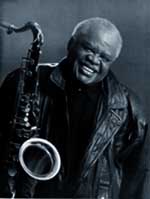
|
|
|
|
|
|
Photo Credit: Carl Studna |
Stanley Turrentine
On this edition of Billy Taylor's Jazz at the Kennedy Center, Dr. Taylor welcomes Stanley Turrentine, one of the most soulful tenor saxophonists to emerge during Blue Note Records' legendary 1960's period. Steeped heavily in the blues, Turrentine was one of the major forces in the development of soul-jazz, and one of the early pioneers of urban jazz-fusion. His instantly persuasive sound is enlivened by a conversational phrasing and rhythmic swagger that's simply captivating. True to the spirit of jazz, Turrentine keeps an open mind regarding various musical genres. When discussing his enormous musical palette, he tells Dr. Taylor that he'll to listen to any music regardless of genre if it has a good melody. Growing up in Pittsburgh definitely had a profound influence of Turrentine's extensive knowledge of music. Turrentine fondly recalls his early days in Pittsburgh when he would casually run into and play with the likes of pianist Ahmed Jamal, bassist Ray Brown, and drummers Kenny Clarke and Art Blakey. In addition to living in a city filled with jazz greats, Turrentine also comes from a very musical family that included among others his brother, the late trumpeter Tommy Turrentine. Turrentine tells a funny story about his father quizzing him and siblings about the jazz musicians heard on the radio, and about his father making a young Stanley stand in the corner to play only one note. At the time, Turrentine didn't understand the exercise, but now he explains that it taught him about overtones. After a brief demonstration, it leads into a gorgeous rendition of the classic ballad, "Tenderly." Now known a father figure in the post-bop, soul-jazz and fusion idioms, Turrentine stills hones his crafts through extensive studies. He tells Dr. Taylor that a lifetime is still not enough to learn all there is about music. Dr. Taylor talks about Turrentine's mastery at the blues, which leads them into an untitled slow blues. After the brief impromptu performance, Turrentine discusses the importance of the blues in his music. Of the various questions of from the audience members, one in particular inquires to whom Turrentine listens to when his at home. Turrentine says that he listens to just about any kind of music and closes his answer by quoting Duke Ellington's famous truism - "There's only two kinds of music, good and bad." Another audience member asks Turrentine about how he constructs his solos. Turrentine says that he first learns the form of the song, and from there he relies on his feelings rather than consciously constructing an improvisation. Turrentine and Dr. Taylor continue by explaining the importance of learning the lyrics of ballads when trying to evoke feeling. Turrentine and Dr. Taylor's trio follows with a lovely reading of Duke Ellington's "In A Sentimental Mood." They quickly change the mood as they close the evening with a reading of Dr. Taylor's penned, "Diz" written for the late trumpeter Dizzy Gillespie.
|
|
| |
This page and its contents Copyright© 2000 National Public Radio
